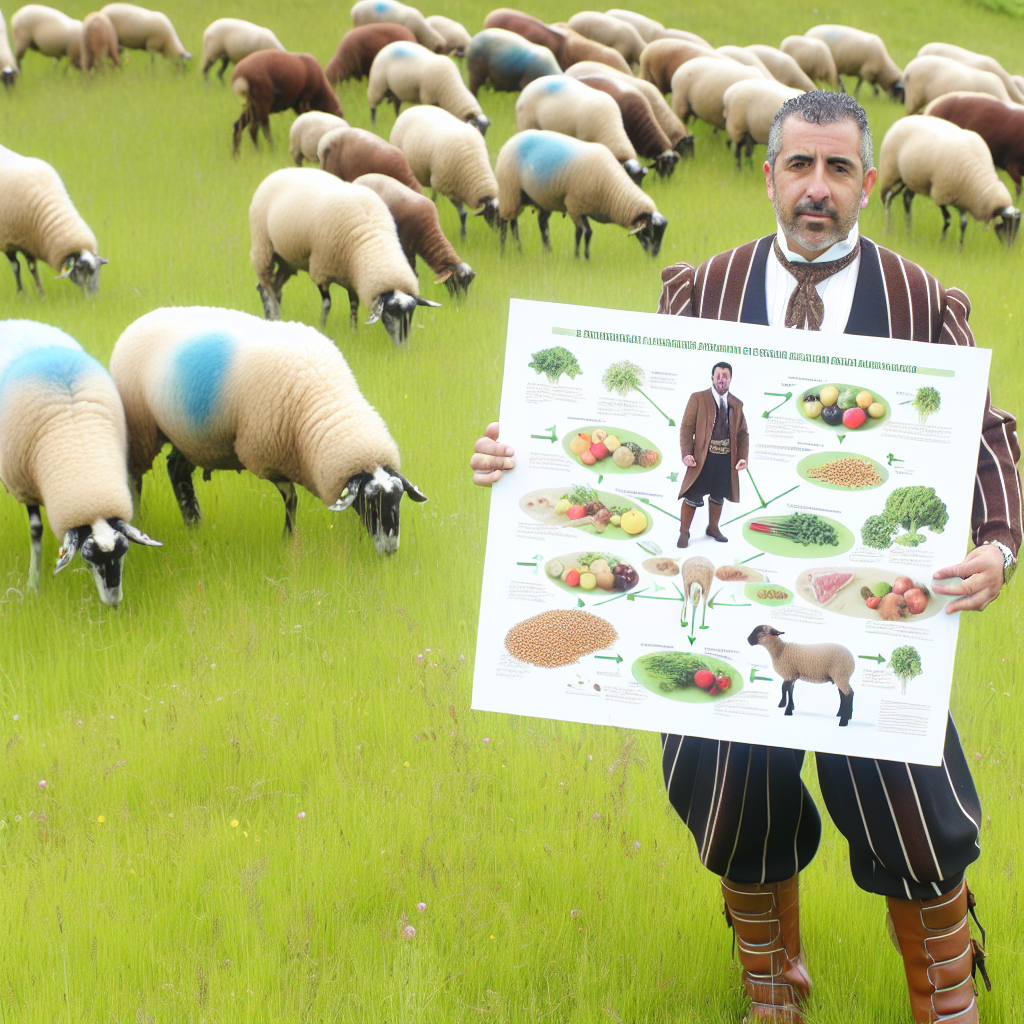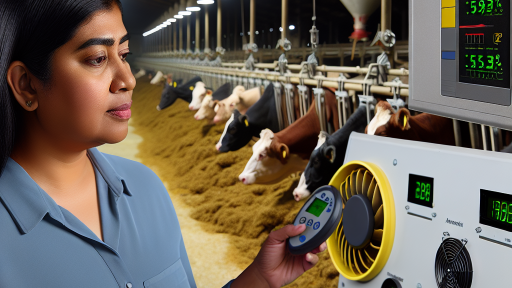Overview of Sheep Nutrition Requirements
Essential Nutrients for Sheep
Sheep require a balanced diet rich in essential nutrients.
These include carbohydrates, proteins, fats, vitamins, and minerals.
Carbohydrates primarily give energy for daily activities.
Proteins are crucial for growth and reproduction in sheep.
Fats provide concentrated energy, essential for high-performance sheep.
Vitamins and minerals aid in overall health and immune function.
Energy Needs
The energy requirements of sheep vary based on several factors.
These factors include age, weight, breed, and production stage.
Growing lambs require more energy than adults.
Pregnant and lactating ewes also have higher energy demands.
Farmers should adjust diets to meet these changing energy needs.
Protein Requirements
Protein is essential for muscle development and wool production.
Young sheep need higher protein levels during growth phases.
Lactating ewes require additional protein to produce milk.
Inadequate protein intake can lead to poor health and productivity.
Transform Your Agribusiness
Unlock your farm's potential with expert advice tailored to your needs. Get actionable steps that drive real results.
Get StartedMinerals and Vitamins
Minerals play a vital role in various bodily functions.
Key minerals include calcium, phosphorus, and magnesium.
Deficiencies can result in health issues like milk fever or grass tetany.
Vitamins, especially A, D, and E, support overall health and vitality.
Providing a mineral supplement can help ensure adequate intake.
Water Needs
Access to clean water is critical for sheep health.
Sheep require fresh water daily for optimal digestion and hydration.
Water intake influences overall nutrient absorption and utilization.
Farmers should always ensure water is accessible to their flocks.
Feeding Strategies
Effective feeding strategies optimize sheep nutrition.
Providing pasture or hay is essential, especially if forage is available.
Supplementing with grains can boost energy intake during critical periods.
Monitoring grazing patterns ensures sheep receive adequate nutrients.
Using feed additives can improve overall diet quality and health.
Essential Nutrients for Sheep Health
Macronutrients
Sheep require a balanced intake of macronutrients for optimal health.
These include carbohydrates, proteins, and fats.
Carbohydrates serve as the primary energy source.
They are vital for growth and overall body function.
Proteins play a significant role in muscle development.
High-quality protein sources include legumes and grains.
Fats also provide concentrated energy and support various bodily functions.
Healthy fats can come from vegetable oils or seeds.
Vitamins and Minerals
Vitamins and minerals are crucial for sheep’s overall well-being.
Significant vitamins include A, D, and E.
Showcase Your Farming Business
Publish your professional farming services profile on our blog for a one-time fee of $200 and reach a dedicated audience of farmers and agribusiness owners.
Publish Your ProfileVitamin A promotes good vision and immune function.
Vitamin D supports bone health and calcium absorption.
Vitamin E acts as an antioxidant and boosts immunity.
Important minerals include calcium, phosphorus, and magnesium.
Calcium is essential for bone development.
Phosphorus aids in energy transfer and metabolism.
Magnesium supports nerve and muscle function.
Water Intake
Freshwater is one of the most crucial necessities for sheep.
It supports digestion and overall physiological processes.
Dehydration can lead to serious health problems.
Ensure sheep have constant access to clean water.
Feeding Practices
Implementing proper feeding practices improves sheep nutrition.
Feed high-quality forage and grains for balanced nutrition.
Regularly analyze feed for nutrient content.
Adjust rations according to the sheep’s life stage and production goals.
Monitor body condition to ensure sheep maintain optimal health.
Recommended Feed Types for Different Life Stages
Nutrition for Lambs
Healthy lambs require nutrient-dense feed during their early growth phase.
Start with high-quality hay or pasture to ensure proper digestion.
Introduce a balanced creep feed to promote faster growth.
Focus on feed that is high in protein and energy to support muscle development.
Add minerals and vitamins specifically formulated for young sheep.
Nutrition for Growing Sheep
As lambs grow, their nutritional needs increase significantly.
Provide a balanced diet rich in high-quality pasture and forage.
Supplement with grains to meet their energy requirements.
Monitor body condition regularly to adjust feed types as necessary.
Incorporate minerals and vitamins to enhance overall health.
Nutrition for Breeding Ewes
Breeding ewes need enhanced nutrition for optimal reproductive health.
Ensure they receive a balanced diet before, during, and after breeding.
Prioritize high-quality pasture and grain to support their energy needs.
Include protein-rich feeds to facilitate healthy fetal development.
Provide access to mineral supplements to prevent deficiencies.
Nutrition for Lactating Ewes
Lactating ewes have increased nutritional demands due to milk production.
Feed high-energy diets to maximize milk yield and quality.
Ensure ample access to pasture and high-quality hay.
Supplement their diet with grains to meet energy requirements.
Monitor their condition to ensure they do not lose excessive weight.
Nutrition for Mature Sheep
Mature sheep require a consistent feeding regimen to maintain health.
Provide a balanced diet with sufficient fiber for digestive health.
Incorporate both pasture and supplemental feeding as necessary.
Consider the sheep’s activity level when adjusting feed portions.
Showcase Your Farming Business
Publish your professional farming services profile on our blog for a one-time fee of $200 and reach a dedicated audience of farmers and agribusiness owners.
Publish Your ProfileInclude minerals and vitamins to support long-term well-being.
Find Out More: Understanding Livestock Genetics for Better Breeding
Importance of Water Quality and Availability
Essential Role of Water in Sheep Nutrition
Water is a critical component of sheep nutrition.
It supports various physiological functions in their bodies.
Additionally, adequate water intake enhances feed efficiency.
Healthy sheep require fresh water daily for optimal performance.
Water Quality Standards
Quality water is vital for the health of sheep.
It should be free from contaminants and pollutants.
Regular testing ensures water meets safety standards.
Clear, clean water promotes better digestion and absorption of nutrients.
Impact of Water Availability
Access to clean water influences sheep productivity.
Limited water can lead to dehydration and health issues.
Proper management of water resources is essential.
Thus, farmers should implement efficient watering systems.
Strategies for Ensuring Quality and Availability
- Regularly clean water troughs to prevent algae growth.
- Test water quality multiple times a year.
- Implement rainwater harvesting where possible.
- Monitor water levels and refill as needed.
These strategies help maintain high water quality.
Moreover, they ensure sheep have constant access to fresh water.
Significance of Water for Optimal Sheep Production
Ultimately, water quality and availability are crucial.
They significantly affect the health and productivity of sheep.
This ensures higher profitability for sheep producers.
You Might Also Like: Sheep and Goat Breeds for Meat Production
Impact of Seasonality on Nutritional Needs
Understanding Seasonal Changes
The nutritional needs of sheep fluctuate with the seasons.
During spring, the pasture grows rapidly, providing ample nutrients.
In contrast, winter brings harsher conditions and limited forage availability.
Farmers must adjust their feeding strategies accordingly.
Spring and Summer Nutritional Requirements
In spring, lush grass offers high protein and energy levels.
Sheep require increased forage intake during this growth period.
Additionally, breeding ewes especially need more nutrients.
The increase in lactation demands energy and protein too.
It is essential to monitor body condition during this time.
Fall and Winter Nutritional Strategies
As autumn approaches, the quality of pasture diminishes.
This seasonal change means sheep often require supplementary feed.
Farmers should provide hay or silage to meet energy needs.
Consistent forage quality is crucial during winter months.
Supplemental minerals and vitamins can support overall health.
Impact of Weather Variability
Weather extremes dramatically affect nutrient availability.
Rain can promote lush pastures, while drought leads to scarcity.
Conversely, excessive snowfall can hinder feeding access.
Farmers should adjust their feeding plans based on these conditions.
Adjusting Feeding Strategies
Understanding seasonal variations aids in better feed management.
Motivate farmers to regularly assess pasture and forage quality.
Showcase Your Farming Business
Publish your professional farming services profile on our blog for a one-time fee of $200 and reach a dedicated audience of farmers and agribusiness owners.
Publish Your ProfilePeriodic body condition evaluations help in nutrient adjustments.
A proactive approach is beneficial for health.
Gain More Insights: Best Practices for Exotic Animal Housing
Common Nutritional Deficiencies in Sheep and Their Solutions
Overview of Nutritional Deficiencies
Nutritional deficiencies can significantly affect sheep health.
Understanding these deficiencies helps in preventing serious health issues.
Common deficiencies include protein, minerals, and vitamins.
Protein Deficiency
Protein is essential for growth, reproduction, and milk production.
A lack of adequate protein can lead to stunted growth.
Additionally, it can affect wool production in sheep.
To address protein deficiency, consider supplementing with alfalfa.
Another option is to include soybean meal in their diet.
Mineral Deficiency
Minerals like calcium, phosphorus, and selenium are crucial for sheep.
A deficiency in calcium can lead to weak bones.
Phosphorus deficiency can impair reproduction.
Selenium deficiency may lead to white muscle disease.
Providing mineral supplements can effectively combat these deficiencies.
Consider using a mineral block for easy access.
Calcium and Phosphorus
Calcium and phosphorus need balanced availability.
Ensure access to limestone for calcium supplementation.
Add dicalcium phosphate for an adequate phosphorus supply.
Selenium
Selenium supplementation is crucial in selenium-deficient regions.
Injectable selenium or selenium-imbued mineral mixes can help.
Vitamin Deficiency
Vitamins A, D, and E are vital for proper sheep health.
A deficiency in Vitamin A can cause poor vision.
Vitamin D is essential for bone health.
Vitamin E supports immune function and cell protection.
Offering a balanced commercial feed helps maintain vitamin levels.
Consider administering vitamin injections during critical periods.
Identifying Deficiencies
Regularly observe sheep for signs of nutritional deficiencies.
Weight loss and poor coat condition often indicate issues.
Consult with a veterinarian for blood tests if deficiencies are suspected.
Practical Feeding Strategies
Implementing effective feeding strategies counters nutritional deficiencies.
Regularly test for nutrient content in forage and feed supplies.
Adjusting feeding regimens based on test results leads to improved health.
Utilizing high-quality feed is a fundamental strategy.
Ensure clean water is always available for optimal digestion.
Discover More: Enhancing Beef Cattle Reproduction Success Rates

Feeding Practices to Optimize Digestibility and Absorption
Understanding Nutritional Needs
Every sheep requires a balanced diet for optimal health.
Nutrition impacts growth, wool production, and reproduction.
Essential nutrients include proteins, carbohydrates, fats, vitamins, and minerals.
Showcase Your Farming Business
Publish your professional farming services profile on our blog for a one-time fee of $200 and reach a dedicated audience of farmers and agribusiness owners.
Publish Your ProfileChoosing the Right Feed
Select high-quality forage as the primary feed source.
Forage should be fresh and free from mold or contaminants.
Incorporate grains to supplement energy needs in high-demand periods.
Always ensure that feed has a balanced nutrient profile.
Feeding Frequency and Quantity
Regular feeding schedules enhance digestibility.
Split daily rations into smaller portions to prevent digestive upset.
Monitor the quantity of feed to prevent overfeeding or underfeeding.
Water Access and Quality
Provide clean and fresh water at all times.
Hydration plays a critical role in nutrient absorption.
Regularly check water sources for contamination and cleanliness.
Utilizing Supplements Wisely
Supplements can enhance the diet when necessary.
Mineral blocks are beneficial, especially in nutrient-deficient soils.
Consult with a veterinarian before introducing new supplements.
Routine Monitoring and Adjustments
Regularly assess the condition of your sheep.
Look for signs of health issues related to nutrition.
Adjust feeding practices based on seasonal changes and production stages.
Incorporating Different Feed Sources
Diversify feed sources to enhance nutrient intake.
Consider using legumes to increase protein levels.
Experiment with different grains to improve energy supplies.
Maintaining a Clean Feeding Environment
Regularly clean feeding areas to promote health.
Removing waste reduces the risk of disease transmission.
Ensure that feed remains dry and uncontaminated.
Impact of Nutrition on Wool Quality and Production
Importance of Nutritional Balance
A balanced diet is crucial for healthy sheep.
Nutrients influence wool production and quality.
Key nutrients include proteins, vitamins, and minerals.
Sheep require adequate energy to support growth.
Each nutrient plays a distinct role in wool characteristics.
Protein and Wool Quality
Proteins form the building blocks of wool fibers.
High-protein diets lead to finer and stronger wool.
Inadequate protein negatively impacts wool yield.
Feeding high-quality protein sources is essential.
Good sources include legumes and oilseeds.
Role of Minerals in Wool Development
Minerals affect wool growth and health.
Key minerals include zinc, copper, and selenium.
Deficiencies may lead to poor wool quality.
For example, zinc is vital for fiber strength.
Providing mineral supplements can enhance wool production.
The Importance of Vitamins
Vitamins also play a significant role in wool health.
Vitamin A supports skin and wool follicle health.
Vitamin E acts as an antioxidant, reducing stress.
Showcase Your Farming Business
Publish your professional farming services profile on our blog for a one-time fee of $200 and reach a dedicated audience of farmers and agribusiness owners.
Publish Your ProfileBalanced vitamin intake can influence overall productivity.
Supplementation may be necessary in some cases.
Nutrition and Seasonal Changes
Seasonal variations affect nutrient availability.
Sheep diets must adapt to changing conditions.
In winter, fiber demand increases for warmth.
During summer, sheep may require additional water.
Adjusting feed composition is crucial for summer and winter.
Monitoring Nutrition for Optimal Results
Regular monitoring helps assess sheep nutrition.
Flock owners should measure wool quality and production.
Adjustments can improve overall herd health.
Consulting a nutritionist can provide valuable insights.
Data-driven decisions lead to better wool outcomes.
Integrating Supplementation for Balanced Diets
Understanding Nutritional Needs
Sheep require a balanced diet for optimal health.
These dietary needs vary based on age, breed, and production stage.
Understanding these factors helps in formulating appropriate diets.
Essential Nutrients Overview
Sheep need a variety of essential nutrients.
Key nutrients include protein, carbohydrates, vitamins, and minerals.
A well-rounded diet supports growth and reproduction.
Protein Sources
High-quality protein boosts muscle development in sheep.
Common sources include soybean meal, alfalfa, and clover.
Carbohydrate Contributions
Carbohydrates provide the energy necessary for daily activities.
Good sources include grains like corn and barley.
Supplementation Strategies
Supplementation can address nutritional deficiencies.
It also enhances overall diet quality and animal performance.
When to Supplement
Sheep may need supplements during specific life stages.
For instance, pregnant or lactating ewes require extra nutrients.
Types of Supplements
There are various types of supplements available.
- Mineral blocks provide essential minerals like calcium and phosphorus.
- Energy supplements, such as molasses, boost caloric intake.
- Protein supplements enhance overall protein consumption.
Monitoring and Adjusting Diets
Regularly assess sheep diets for effectiveness.
This includes monitoring body condition and growth rates.
Make adjustments based on observation and testing.
Utilizing Feed Tests
Feed testing helps in understanding the nutritional content of feeds.
It provides valuable insights for better diet formulations.
Working with Nutritionists
Consulting with livestock nutritionists promotes effective diet planning.
They can offer tailored recommendations based on specific needs.
Guidelines for Monitoring Sheep Body Condition Scores
Importance of Body Condition Scores
Monitoring body condition scores is crucial for sheep health.
It helps assess nutritional needs and overall wellness.
Regular evaluations can prevent health issues down the line.
Understanding Body Condition Scores
Body condition scores range from one to five.
Score one indicates extreme emaciation, while score five indicates obesity.
A score of three is typically considered ideal for most sheep.
Showcase Your Farming Business
Publish your professional farming services profile on our blog for a one-time fee of $200 and reach a dedicated audience of farmers and agribusiness owners.
Publish Your ProfileEvaluation Techniques
Use visual assessments to gauge body condition.
Palpation of the spine and ribs provides additional insights.
Look for muscle coverage and fat deposition around key areas.
Identifying Targets
Target scores may vary depending on the sheep’s purpose.
Breeding ewes often need higher scores for successful pregnancies.
Market lambs benefit from optimal scores for weight gain.
Frequency of Assessments
Conduct body condition assessments at regular intervals.
Consider evaluating prior to breeding, lambing, and weaning.
Monitor changes regularly to address issues promptly.
Documenting Findings
Keep accurate records of body condition scores.
Use tracking logs to monitor individual or flock condition.
Documenting trends will help refine nutritional strategies.
Adjusting Nutrition Based on Scores
Make dietary adjustments according to body condition scores.
Provide more energy-dense feeds for lower-scoring sheep.
Reduce feed intake for those at risk of becoming obese.
Consulting Professionals
Engage with veterinarians or animal nutritionists for guidance.
They can provide tailored recommendations based on assessments.
Consider seeking advice particularly during critical management periods.
Additional Resources
National Animal Health Monitoring System (NAHMS) Studies
Guide for the Care and Use of Laboratory Animals, 8th edition …




